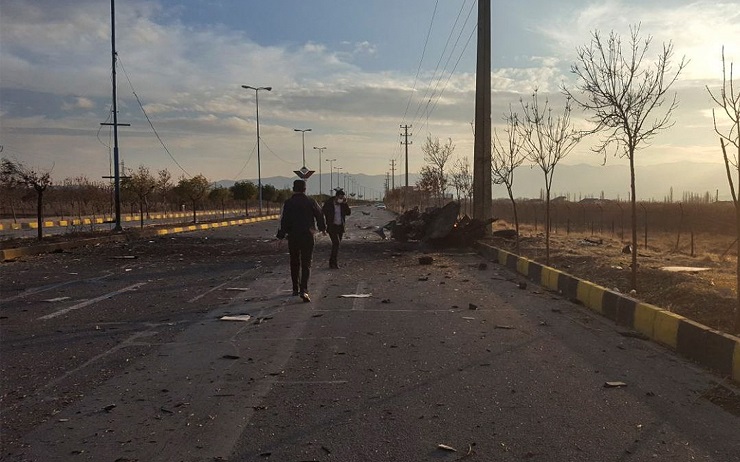In any zero-sum competition, one man’s loss is another man’s gain. This is especially true of intense geo-political rivalries characterized by deep-seated and hardline ideological positions. When Iran’s top nuclear scientist, Mohsen Fakhrizadeh, was assassinated last week, it meant a major Iranian loss and a crucial gain for Iran’s rivals in the region and beyond who have been looking for ways to reverse and sabotage Iran’s nuclear capacity. But the killing wasn’t just meant to damage Iran’s nuclear programme; for, surely the assassinated scientist wasn’t the only person running Iran’s nuclear plants. The assassination, broadly speaking, was aimed at creating such conditions in the region that would elevate the level of tensions to such heights that the US president-elect, Joe Biden, will have a really hard time reviving the JCPOA.
Assassinations, a hallmark of Israel, stand integrated with complex geo-political matters. Interestingly enough, at a press conference in April 2018, Benjamin Netanyahu had directly mentioned Fakhrizadeh, alluding the scientist was in the Mossad’s crosshairs — “Remember that name,” Netanyahu had insisted.
Pushing Back the revival of JCPOA
A revival of JCPOA would end the Trump administration’s “maximum pressure” on Iran. It would also ease the currently imposed embargoes and allow Iran to restart its economic relations with Europe, increasing its oil sales. In nutshell, a revival of JCPOA would add to Iran’s national power potential and increase its capacity vis-à-vis its rivals i.e., Israel, Saudi Arabia, and the UAE. The assassination, in this context, was meant to sabotage Biden’s bid to re-enter the nuke-deal, which was signed when he was the vice-president, and normalise relations with Iran.
If nothing else, the out-going Trump administration, which has very close relationship with Israel’s incumbent leader, Benjamin Netanyahu, is doing all it can to complicate things enough to prevent a quick reversal of “maximum pressure.”
The intention was quite evident when the US Secretary of State Mike Pompeo, who recently visited Israel, on Friday announced new economic sanctions against some Chinese and Russian firms accused of having supported Iran’s missile program.
“This administration… is here until January 20” and will “continue to pursue its policies,” a senior US official traveling with Pompeo said during a stop Sunday in Abu Dhabi. “I would hope that this leverage that the administration works so hard to get will be used to good purpose to get the Iranians to, once again, start behaving like a normal state.”
Iran has already vowed to revenge this assassination. An Iranian response will be deliberately projected as an evidence of its “destabilizing activity” in the region, something that the pro-Israel lobbies in Washington will use to put pressure on the Biden administration to re-think its normalization plans with Iran.
Israel as the ringleader against Iran
The Abraham Accords, signed earlier this year, were always meant to make Israel indispensable to the Middle East. It’s importance increases massively in the wake of a decreasing US military presence in the Middle East, or its increasingly inability to project military power on a scale it could ten years ago. The US is withdrawing from Afghanistan and it has been unable to control the outcome of Syria. The Gulf Arab states accordingly see in Israel a credible ally that not only strongly shares their rivalry with Iran, but also has the capacity and the will to take decisive actions, such as the [alleged] assassination of Iran’s top nuclear scientist.
While the assassination attests Israeli’s capacity and will, its increasing open rapprochement with the Gulf Arab world does speak volumes about its gains elsewhere.
Netanyahu was in Saudi Arabia on November 22, meeting MBS and charting a new course of Israel’s relations with the Gulf states. They discussed the shifting realities of the Middle in the supposed post-US and post-Trump era and discerned possibilities of deep convergence.
For Saudi Arabia, it is but natural to get close to Israel in the wake of the up-coming Biden administration vowing to put more pressure on Saudi Arabia, including on issue like human rights and war in Yemen.
There is no gainsaying that the Saudis, like the Israelis, have serious concerns with regards to JCPOA and its potential revival under the Biden administration.
The coming together of Israel and Saudia (and the UAE) with regards to Iran is the latent motive of the Abraham Accords and a potential operationalization of the “strategic agenda” of these accords.
As it stands, the agreement signed by the UAE and Israel at the White House on September 15 included mention of a “Strategic Agenda for the Middle East.” The Strategic Agenda was not limited to Israel and the UAE, and noted that “others, as appropriate” could join to “advance regional security and stability.”
While Saudi Arabia is yet to “officially” join the agenda, there is no denying that it has always been involved in this agenda-setting.
All in all, Israel stands as the biggest beneficiary of this assassination. It has unleashed forces that could seriously complicate the prospects of the revival of JCOPA. At the same time, it has very effectively stamped its indispensability to the Gulf states. The Saudis, who couldn’t hide their involvement in the murder of Jamal Khashoggi, could very well learn from Israel the art of assassinations.
Salman Rafi Sheikh, research-analyst of International Relations and Pakistan’s foreign and domestic affairs, exclusively for the online magazine “New Eastern Outlook”.

